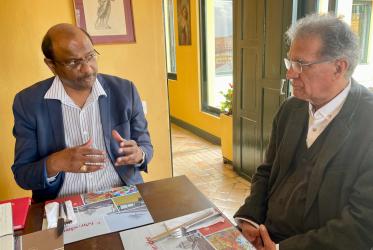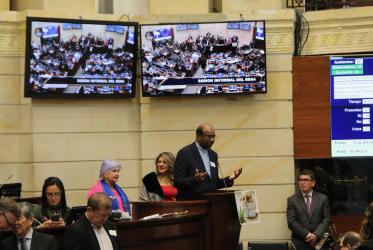When a wide-ranging ecumenical group discussed “Transitional Justice in Colombia, implications for the peace process”, many of the speakers seemed worried that the great hope there was back in 2016 seems to have dissipated and much more work for peace is needed.
At the 7 June meeting, speakers referred to a peace process to end the 50-year conflict in the South American country, a faltering process that needs much attention and hard work as massive wealth and resource inequalities in the country continue to exist.
The meeting was held at the Ecumenical Center on 7 June under the auspices of the ACT Alliance, the Lutheran World Federation and DIPAZ - Diálogo Intereclesial por la Paz, a Colombia-based peacebuilding group.
A panel featured voices from Diálogo Intereclesial, with which the World Council of Churches (WCC), ACT Alliance and the Lutheran World Federation have a good collaboration.
ACT general secretary Rudelmar Bueno de Faria moderated the meeting and noted the variety of viewpoints expressed.
“Keeping the dialogue with ELN is crucial to keeping the peace process,” said de Faria, referring to one of the armed groups involved in the Colombian conflict.
The panel also followed on the visit of a DIPAZ delegation to New York City last week, facilitated by the WCC, in which they met members of the United Nations Security Council.
‘Greatest concerns’
“Together, we monitored the greatest concerns about what we saw as the slow implementation of the accords, and we raised these concerns in international arenas such as the UN system, including with the UN Security Council and the UN verification mission in Colombia,” said WCC deputy general secretary, Prof. Dr Isabel Apawo Phiri as she spoke about concerns around “troubling current trends”.
“Since last August, when the new President Iván Duque Márquez was inaugurated, we have seen attempts by the new government to limit the Special Jurisdiction of Peace,” she said.
This is a space “originally conceived to serve as an alternative whereby all perpetrators of human rights violations in the political conflict would go through a process of restorative justice and reconciliation.”
“We support the Special Jurisdiction of Peace, mostly because it was the process agreed upon by both the FARC and the Colombian Government and we want to see both parties keep their agreements,” said Phiri.
Although the previous Colombian president, Juan Manuel Santos, negotiated a peace treaty with the FARC-guerrilla group in 2016, the country has rejected ratification of that in a national referendum.
Dr Ojot Ojulu, the Lutheran World Federation’s assistant general secretary for International Affairs and Human Rights, outlined work done by the Lutheran communion in Colombia.
Colombian in exile
Olga Montoya, a Colombian who lives in exile in Switzerland from the Bloc Solidaridad Latino America, said that in many countries the state protects citizens “but in Colombia, citizens have to protect themselves from the state”.
She said that Colombia suffers from great inequality, and there are only three careers for young people – the law, engineering and medicine.
“The average monthly wage is 250 (U.S.) dollars, but to sign up for medical studies costs 7,000 dollars,” said Montoya.
Danilo Rueda, member of DIPAZ executive committee, who spoke of the implications of the breakdown of the dialogue with the ELN guerrilla group for the peace process also noted that currently, the groups who are suffering the most are “indigenous Colombians and peasants,” those who voted for peace.
Speakers rued that some evangelical and Pentecostal churches funded from the United States were trying to prevent the peace process that was negotiated.
Todd Howland, who was the representative of the United Nations High Commissioner for Human Rights in Colombia for seven years until 2018 regretted that the United Nations had let down the people of the country on the peace accord by “not seeking out” the type of support that was needed for it.
He recounted, with photographs, how one occasion which he witnessed a group of former FARC guerrillas had engaged in what amounted to “an act of contrition” at a meeting brought about by the Roman Catholic Church for an attack on the area that deeply disturbed the local community.
By engaging with the population and by listening to complaints of local people, they helped in the reconciliation process.
Gender justice
Rev. Dr Elaine Neuenfeldt from the ACT Alliance told the meeting that gender justice is a crucial part of the peace process, and those who have conducted sexual violence in acts of war cannot be exonerated.
She said it is vital that faith-based organizations have a role to play in gender justice in Colombia.
“Raising this subject takes courage and having a prophetic voice in Latin America takes courage,” said Neuenfeldt. Churches should not be concerned about losing membership, she said, adding that “if we don’t raise” the issue of justice for women, it will have a huge negative influence on the peace process.
"WCC backs calls for crucial peace, dialogue in Colombia" - WCC news release 6 June 2019




